 |
 |
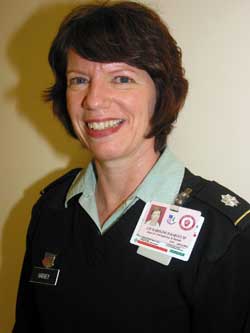
|
|
Lieutenant Colonel (Lt. Col.) Karoline D. Harvey, Occupational Therapist, Internship Director of Occupational Therapy, Walter Reed Army Medical Center, Washington, D.C.
|
1. I chose this career because...
2. My typical workday involves...
3. What I like best/least about my work …
4. My career goals are...
5. When I'm not working, I like to...
|
|
1. I chose this career because...
|
Back to Top

|
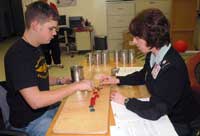
|
|
Lt. Col. Karoline Harvey uses basic items like cans and checkers to evaluate a patient's hand function during the Jebsen-Taylor Functions test.
|
I chose to become an occupational therapist because I always liked science. I began to consider occupational therapy (OT) as a career when my identical twin sister fell-off a horse and broke her arm. She required OT during her recovery. While working on my biology degree, I was further inspired to consider OT. I worked in the lab of my mentor whose daughter was an occupational therapist.
My undergraduate training required fieldwork, and I completed rotations in:
- Physical disabilities at the Brook Army Medical Center, Fort Sam Houston, Texas
- Pediatrics at the Gonzales Rehabilitation Center in Gonzales, Texas
- Psychiatry at the Children’s Psychiatric Hospital in Tulsa, Oklahoma
After I obtained my certification in occupational therapy, I entered the military. I completed my internship through the military under the direction of Col. Howard.
Education and Certification
- Bachelor of Science, Biology, Occupational Therapy, Texas Women’s University, Denton, Texas
- Master of Science, Gerontology, University of the Incarnate Word, San Antonio, Texas
- Certification, Occupational Therapy, National Board of Certification for Occupational Therapy (NBCOTA)
|
|
2. My typical workday involves...
|
Back to Top

|
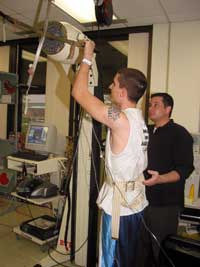
|
|
Lt. Col. Harvey's colleague assists a patient using the Baltimore Therapeutic Exerciser which increases strength and range-of-motion of upper body muscles.
|
My typical workday is divided between my student training, clinical and research responsibilities.
As the Occupational Therapy Internship Director, I meet with students in the morning to:
- Organize their schedules and track their progress towards meeting their goals;
- Review patient evaluations, assessments and treatment plans and
- Complete patient rounds in the clinic.
On Monday and Wednesday mornings, I:
- Complete paperwork and administrative duties and
- See walk-in patients
As a principle investigator, I work on 2 research projects that involve amputees and focus on:
- Computers that work with voice activation – Patients are trained to complete tasks using a computer that responds to their voice. This training gives the patient a means of furthering their education or widening their job opportunities. It may also offer them the option to return to active military duty, a decision that will be determined by a medical review board.
- Rehabilitation of the patient to return to active duty or in their MOS (military occupational specialty). The patient receives training to complete common tasks (in new ways) that are required by their MOS. A subset of this program is training with FATS (Fire Arms Training Simulator). This simulation system is designed to provide training in the handling and use of small and supporting arms. As an example, patients will train with a duplicate of the rifle used in combat and will need to respond as such. The computer screen will simulate the action that takes place in a hostile field operation. The patient’s response time and accuracy of response will be measured by FATS.
In the afternoon, after completing my student and research responsibilities, I see patients in the orthopedic clinic that have scheduled appointments. Treating orthopedic patients involves:
- Therapeutic treatments of the upper extremities to improve the range of motion and increase strength;
- Splinting of injured areas to provide stability during recovery;
- Modalities, which are treatments used to soften tissue and ease discomfort such as application of heat or ice, scar massage and electric stimulation and
- Rehabilitation in activities of daily living so that patients can independently bath and dress themselves, cook and clean, etc…which takes place in our apartment setting.
|
|
3. What I like best/least about my work …
|
Back to Top

|
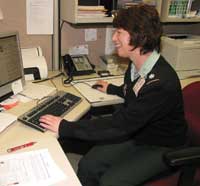
|
|
Lt. Col. Karoline Harvey works at her desk.
|
What I like best about my work is working with the patients. We do a lot of task analysis, that is, breaking down a task into its various components. You need to have a thorough understanding of how a task is completed, including what muscles are involved, the range of motion and the senses that are involved. I often ask my students to do a task analysis as a teaching tool and grade them upon completion. I also enjoy giving my patients devices that they can take back to their everyday environment which can aid them in completing daily tasks. The patients we see here are special. The work is challenging but also very rewarding.
What I like least about my work is the administrative tasks, such as the paperwork and the extensive documentation of patient treatment. However, these tasks are very important, especially for continuing patient care at other facilities. Managing a clinic can be challenging. You are responsible for the clinic and the personnel as well. With responsibility, you must make tough decisions. You can’t make everyone happy, so you must make decisions that are for the overall good of the clinic.
|
|
4. My career goals are...
|
Back to Top

|
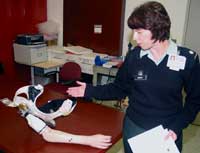
|
|
Lt. Col. Harvey is pictured with a prosthesis that helps increase independence of an amputee.
|
My career goals are to complete a Ph.D. in Occupational Therapy and to pursue more specialized training. I plan to stay in the military. I enjoy working in this environment. It gives you a diversity of experiences. You have the opportunity to teach and do research as well.
|
|
5. When I'm not working, I like to...
|
Back to Top

|
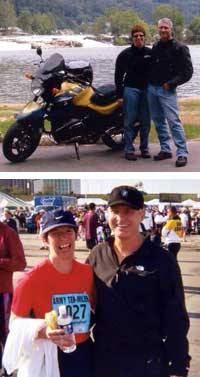
|
|
Lt. Col Harvey and her husband enjoy motorcycle riding and are pictured near Charleston, West Virginia (top) and at the annual Army 10-Miler race (bottom).
|
When I’m not working, I like to go running with my husband and compete in races. Last year, I competed in the annual Army 10-miler. We also go on camping trips and riding on my husband’s motorcycle. We enjoy a lot of outdoor activities.
|
|
|
|
 |